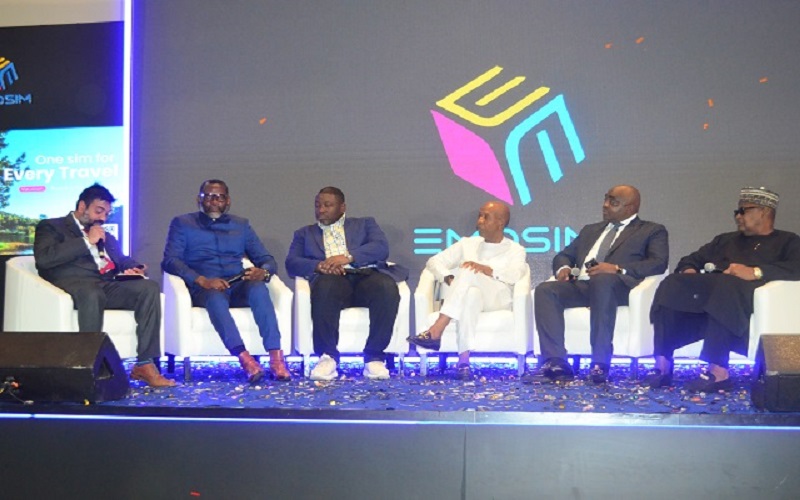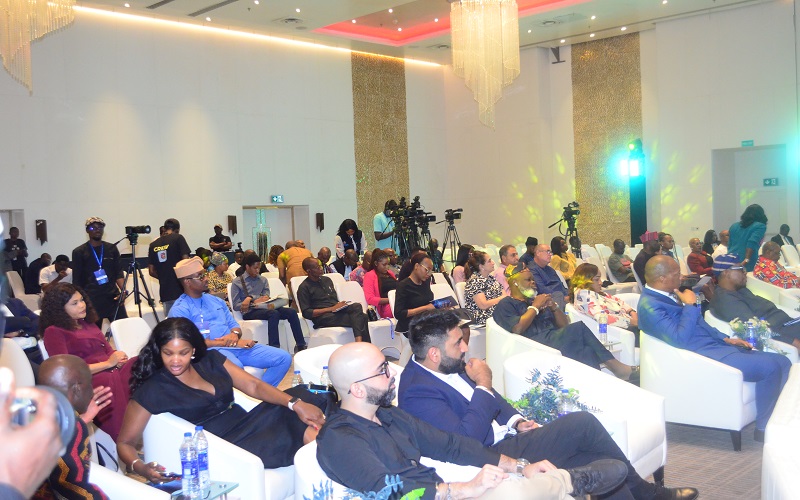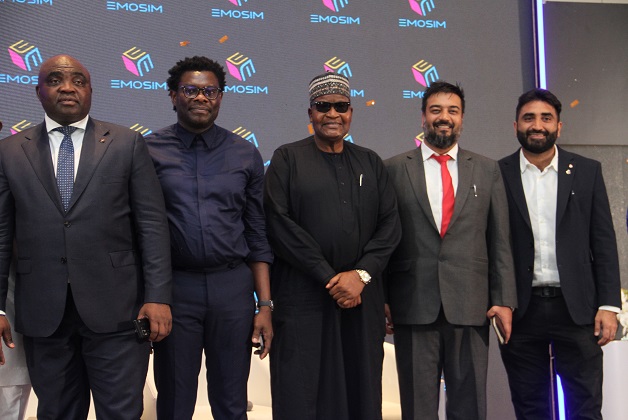News Highlights:
- EMOSIM’s eSIM technology allows users to access mobile networks in over 190 countries without physical SIM cards or roaming fees.
- The launch was widely celebrated as a practical outcome of Nigeria’s forward-thinking telecom policies, with strong endorsements from regulatory leaders and private sector players.
EMOSIM, a pioneering mobile virtual network operator (MVNO), officially launched its global eSIM product in Lagos on Wednesday, positioning Nigeria at the forefront of digital innovation and global connectivity, reports Digital TimesNG.
At a well-attended event graced by telecom regulators, private sector leaders, and innovation advocates, EMOSIM’s Chairman and Founder, Mr. Jimmy Eboma, described the launch as “a pivotal moment, not just for Emosim, but for every Nigerian traveller, entrepreneur, and dreamer who has ever felt the weight of the world’s digital divides.”
The EMOSIM solution is a digital eSIM product that offers seamless, contract-free mobile connectivity across more than 190 countries and 600 networks. With no need for physical SIM cards, roaming charges, or language-dependent onboarding abroad, it aims to eliminate common frustrations for African travelers and business professionals.
“Imagine stepping off a plane in Dubai, London, or New York,” Eboma said. “You expect your phone to buzz with calls and emails, but instead, you meet silence, roaming charges, and foreign queues for SIM cards. Today, that story changes.”
“Connectivity is not a luxury—it’s a lifeline. With one tap, Nigerians can access the world without borders. No swaps. No shocks. Just seamless communication,” he said, praising EMOSIM’s technical partner, Tata Communications, for fusing global reach with local insight to build the platform. “Africa doesn’t follow trends—we set them,” he declared.

While rooted in Nigeria, EMOSIM aims to address global challenges, according to Eboma who positioned the company as part of a broader African innovation wave that is reshaping industries from fintech to renewable energy to telecommunications. “This is Africa’s time,” he declared. “While others see barriers, we see blueprints.”
The event also featured a lively Fire Chat session where Professor Umar Garba Danbatta, former Executive Vice Chairman of the Nigerian Communications Commission (NCC), applauded EMOSIM’s emergence as a practical result of Nigeria’s telecom reforms.
Congratulating Mr. Jimmy Eboma, Chairman and Founder of EMOSIM, Danbatta described the launch as a strong validation of Nigeria’s telecom reform journey. “You are truly helping to solve a real problem, providing affordable, reliable telecommunications services to people who have historically been left behind.”
“Among the entities evaluated, EMOSIM stood out,” said Danbatta, who was instrumental in championing MVNO licensing during his tenure. “They met every requirement and are now solving real problems—bringing affordable, reliable telecom services to people who have historically been left behind.”

Danbatta praised EMOSIM’s role in promoting digital inclusion, saying, “Your work aligns perfectly with the broader strategic goals of the NCC and the Federal Ministry of Communications, Innovation, and Digital Economy. It also supports the goals of the Ministry of Trade, as digital connectivity increasingly plays a critical role in commerce and economic inclusion.”
He highlighted three key pillars that define universal access to telecom services, namely: availability, accessibility, and affordability, stating that EMOSIM embodies all three. “These principles form the very essence of digital inclusion and national development,” he noted.
The former NCC EVC hailed EMOSIM as a prime example of regulatory foresight being transformed into practical innovation. “As long as this synergy between government policy and regulatory execution continues, Nigeria will remain a leader in Africa’s digital transformation,” Danbatta affirmed.
Dr. Jobson Ewalefoh, Director General of the Infrastructure Concession Regulatory Commission (ICRC), added an infrastructure and policy perspective to the conversation, describing EMOSIM as a symbol of Nigeria’s transition into a data-driven, innovation-powered economy.
Ewalefoh, known for his advocacy of infrastructure reform through strategic partnerships and innovation, highlighted that EMOSIM’s emergence signalled more than a technological shift but it underscored the growing national emphasis on data-driven solutions. “The importance and the emphasis on data will always strike in this innovation that is in this country today,” he remarked.
Ewalefoh challenged stakeholders to translate the excitement around EMOSIM’s launch into a collective push for structural change. “It’s time we grow this account book not just from resources, but from ideas, intellect, and research,” he stated, urging policymakers to build an enabling environment for startups like EMOSIM to thrive.
Mr. Tony Agenmonmen, immediate past President of the National Institute of Marketing of Nigeria (NIMN), praised the eSIM product as a solution to real-world travel frustrations. “When you leave this country, the first thing you want to do is tell your loved ones that you are safe,” he noted, recounting the frustrations of forgetting to activate roaming services, struggling with SIM card swaps, and facing language barriers when trying to get connected in non-English-speaking countries.
Agenmonmen praised EMOSIM for simplifying that experience. “I think Ibn Hussein has come up with a solution,” he said, applauding the team for addressing an issue that resonates with so many global travellers. “The fact that this is coming from a Nigerian company, by Nigerians, of course, with the support of Tata, I think it brings a kind of confidence that good things can come from Nigeria.”
Calling it a timely innovation from a Nigerian firm, he encouraged others to see innovation as an ecosystem, not a competition.
Mr. Bayo Adedeji, CEO of Wakanow, stressed the economic impact of localizing eSIM services. He explained that Wakanow currently purchases eSIMs from foreign vendors, paying in U.S. dollars while receiving revenue in naira—thereby bleeding foreign exchange.
“With EMOSIM, that changes. We serve 1.5 million customers, and now we can offer this product without bleeding FX. That’s not just innovation—it’s economic transformation.”
Adedeji also emphasized the product’s export potential, noting that Wakanow operates in 28 countries. “We’re not just saving FX, we’re earning it. That’s the real power of this innovation,” he said, adding that EMOSIM could significantly reduce barriers for African travellers, making regional trade and movement smoother.
Adedeji described EMOSIM’s potential impact as pivotal to unlocking true African trade and integration. “This opens the gateway to genuine African interconnectivity. It allows us to do more across borders, and it lays the foundation for easier travel and trade.”
He concluded on a confident and optimistic note: “I’m excited to partner with EMOSIM. I’m excited about the impact, the opportunity, and yes—I’m excited about the money we’re going to make together. The future looks bright.”
Capping the discussions, EMOSIM CEO Karn Gulati underscored the company’s global ambitions and Nigeria’s rising stature. “Tata Communications believed in us. That’s not just trust in a product—it’s trust in Nigeria,” he said, and noted that EMOSIM’s partnerships across 190 countries illustrate the platform’s scalability and impact potential.
Gulati echoed the theme that access and connectivity are not ends in themselves but catalysts for business and wealth creation. “Connectivity opens us up to so much—it makes business easier, it creates wealth, and it strengthens Nigeria’s role as a global digital player.”
The EMOSIM launch was more than a product unveiling—it was a powerful showcase of Nigerian innovation, private-public synergy, and the promise of Africa’s digital future. With a fusion of regulatory foresight, technical expertise, and entrepreneurial spirit, EMOSIM is poised to make global connectivity truly borderless—and proudly Nigerian.

